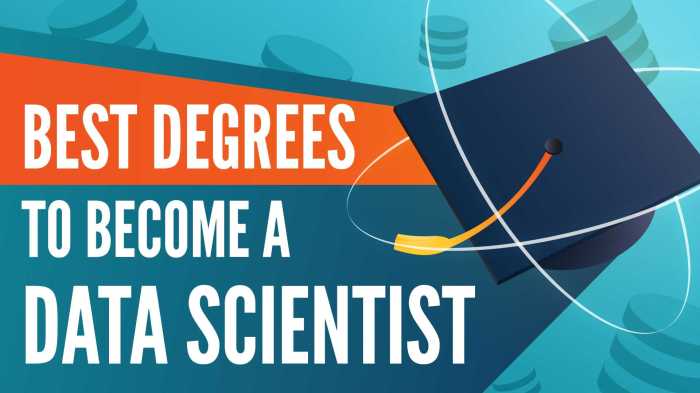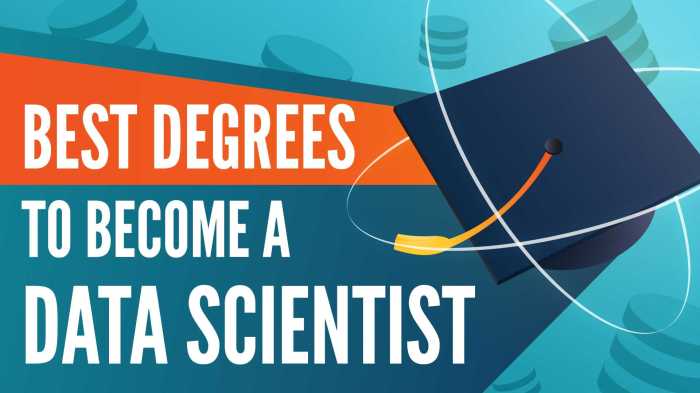Online data science degrees are rapidly becoming the preferred pathway for individuals seeking to enter this high-demand field. With the rise of big data and the increasing reliance on data-driven decision-making across industries, the need for skilled data scientists has skyrocketed.
Pursuing an online data science degree offers flexibility, accessibility, and the opportunity to gain valuable knowledge and skills from the comfort of your own home.
From understanding complex algorithms to mastering data visualization techniques, online programs provide a comprehensive foundation in data science principles. Whether you’re a recent graduate or a seasoned professional looking to transition into this exciting field, online data science degrees offer a structured and engaging learning experience.
Types of Online Data Science Degrees
Online data science degrees provide a flexible and convenient way to learn the skills needed to succeed in this rapidly growing field. There are various options available, catering to different career goals and educational backgrounds.
Looking for a way to keep your kids engaged and learning outside of the classroom? Consider exploring online education programs for kids. These programs offer a flexible and engaging way for children to learn new skills and expand their knowledge base.
From coding to art, there’s a program out there for every interest.
Types of Online Data Science Degrees
Data science degrees are offered at various levels, each with its own curriculum and learning outcomes. Here’s a breakdown of the most common types:
| Degree Type | Duration | Typical Coursework |
|---|---|---|
| Bachelor’s in Data Science | 4 years |
|
| Master’s in Data Science | 2 years |
|
| Data Science Certificate | 6 months to 1 year |
|
Key Skills Covered in Online Data Science Programs
Data science programs equip students with a comprehensive skillset, enabling them to analyze vast amounts of data, extract meaningful insights, and drive informed decision-making. These programs cover a wide range of technical and soft skills, essential for success in this dynamic field.
Programming Languages
Programming languages are the foundation of data science, enabling data manipulation, analysis, and model building.
- Python:Python is a popular choice for data science due to its versatility, readability, and extensive libraries like NumPy, Pandas, and Scikit-learn. These libraries provide tools for data manipulation, analysis, visualization, and machine learning.
- R:R is another powerful language widely used in data science, particularly for statistical analysis and visualization. Its comprehensive packages like dplyr, ggplot2, and caret provide tools for data manipulation, statistical modeling, and machine learning.
- SQL:SQL is essential for interacting with relational databases, enabling data retrieval, manipulation, and analysis. It is commonly used to query large datasets, extract relevant information, and prepare data for analysis.
Statistics and Probability
A strong foundation in statistics and probability is crucial for understanding data, interpreting results, and building effective models.
- Descriptive Statistics:This branch of statistics involves summarizing and visualizing data using measures like mean, median, mode, standard deviation, and variance. It helps in understanding the central tendency and variability of data.
- Inferential Statistics:This branch deals with drawing conclusions about a population based on a sample of data. It involves techniques like hypothesis testing, confidence intervals, and regression analysis.
- Probability Theory:This branch focuses on understanding the likelihood of events occurring. It involves concepts like probability distributions, conditional probability, and Bayes’ theorem, which are essential for building predictive models.
Machine Learning
Machine learning is a core component of data science, enabling computers to learn from data and make predictions or decisions.
- Supervised Learning:This type of machine learning involves training models on labeled data, where the input features and corresponding outputs are known. It includes algorithms like linear regression, logistic regression, support vector machines, and decision trees.
- Unsupervised Learning:This type of machine learning involves training models on unlabeled data, where the output is unknown. It includes algorithms like clustering, dimensionality reduction, and association rule mining.
- Reinforcement Learning:This type of machine learning involves training models to interact with an environment and learn through trial and error. It is used in applications like robotics, game playing, and recommendation systems.
Data Visualization
Data visualization plays a crucial role in communicating insights and presenting findings effectively.
- Data Exploration:Visualization helps in exploring data, identifying patterns, and understanding relationships between variables. Tools like histograms, scatter plots, and box plots are commonly used.
- Storytelling:Data visualization can be used to create compelling narratives, communicate insights clearly, and engage audiences. Tools like bar charts, line charts, and maps are often used for this purpose.
- Dashboard Design:Dashboards provide a centralized view of key metrics and data points, enabling users to monitor performance and make informed decisions.
Data Wrangling and Preprocessing
Data rarely comes in a clean and ready-to-use format. Data wrangling and preprocessing are essential steps to prepare data for analysis and modeling.
If you’re passionate about helping others and want to make a difference in the world, an accredited online master’s in social work could be the perfect path for you. These programs equip students with the knowledge and skills needed to address complex social issues and advocate for positive change.
- Data Cleaning:This involves identifying and handling missing values, outliers, and inconsistencies in the data. Techniques like imputation, outlier removal, and data transformation are used.
- Data Transformation:This involves converting data into a suitable format for analysis. Techniques like normalization, standardization, and feature engineering are used.
- Feature Selection:This involves selecting relevant features from the dataset that are most predictive of the target variable. Techniques like correlation analysis, feature importance, and recursive feature elimination are used.
Communication and Collaboration
Data scientists need to effectively communicate their findings to stakeholders, both technical and non-technical.
- Data Storytelling:Data scientists must be able to present their findings in a clear, concise, and engaging manner, using data visualization and storytelling techniques.
- Technical Communication:Data scientists need to communicate effectively with other data professionals, using technical language and industry-specific terminology.
- Collaboration:Data science often involves working in teams, requiring effective collaboration, communication, and coordination.
Domain Knowledge
Domain knowledge is essential for understanding the context of data, formulating relevant questions, and interpreting results.
- Business Acumen:Understanding business processes, goals, and challenges helps data scientists to apply their skills to real-world problems.
- Industry Expertise:Familiarity with specific industries like finance, healthcare, or marketing allows data scientists to tailor their analysis and insights to the needs of the industry.
- Problem-Solving Skills:Data scientists need to be able to identify problems, formulate hypotheses, and develop solutions using data-driven approaches.
Choosing the Right Online Data Science Program
Navigating the world of online data science programs can be overwhelming. With numerous options available, choosing the right program requires careful consideration of your individual needs, goals, and preferences. This section Artikels key factors to consider, emphasizing the importance of accreditation and program reputation.
It also delves into different program formats, highlighting their respective strengths and weaknesses.
Accreditation and Program Reputation
Accreditation and program reputation are paramount when choosing an online data science program. Accreditation signifies that a program meets specific quality standards and is recognized by industry professionals.
- Accreditation from reputable organizations like the Accreditation Council for Business Schools and Programs (ACBSP) or the Distance Education Accrediting Commission (DEAC) provides assurance that the program meets rigorous academic standards.
- A program’s reputation is equally important. Research the program’s faculty, alumni network, and industry partnerships to understand its standing in the data science community.
- Look for programs with strong ties to industry and a proven track record of placing graduates in successful data science roles.
Program Format
Online data science programs are offered in various formats, each with its unique advantages and disadvantages.
- Self-paced programsoffer flexibility, allowing students to learn at their own pace. However, self-discipline and motivation are crucial for success in this format.
- Cohort-based programsinvolve a structured learning experience with fixed deadlines and group interaction. This format fosters collaboration and provides a sense of community, but it may require a higher time commitment.
- Hybrid programscombine elements of self-paced and cohort-based learning, offering a balance between flexibility and structure.
Checklist for Choosing an Online Data Science Program, Online data science degrees
Here is a comprehensive checklist to guide your decision-making process:
- Define your career goals: Determine what you hope to achieve with a data science degree. Are you aiming for a specific role, industry, or research area?
- Assess your learning style: Consider your preferred learning environment and how you learn best. Are you more comfortable with self-paced learning or a structured cohort-based program?
- Evaluate program curriculum: Ensure the program covers the essential data science skills and aligns with your career aspirations. Look for courses in statistics, programming, machine learning, and data visualization.
- Check faculty credentials: Investigate the qualifications and experience of the program’s instructors. Look for faculty with industry experience and strong research backgrounds.
- Examine program resources: Assess the program’s support services, such as career counseling, technical assistance, and access to industry networks.
- Consider program cost and financial aid: Compare tuition fees, scholarships, and other financial aid options available.
- Read student reviews and testimonials: Gain insights from previous students about their program experience, including the quality of instruction, support services, and career outcomes.
Final Review: Online Data Science Degrees

As the demand for data scientists continues to grow, online data science degrees provide a valuable pathway to success. By acquiring the necessary skills and knowledge, you can position yourself for a fulfilling and lucrative career in this dynamic field.
With the flexibility of online learning, you can tailor your education to fit your personal and professional goals, ultimately empowering you to make a meaningful impact in the world of data.
